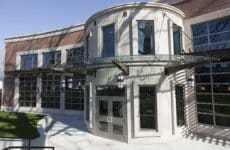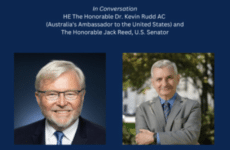By: Stephanie Savage
Posted In: News

Photo credit: Kristen Tomaiolo
When politics professor Mary Anne Clarke attempts to explain the multitude of young voters who have become politically active this year, she immediately points towards political campaigning.
With popular youth-oriented television programs like MTV encouraging younger viewers to vote through promotion of hip media campaigns such as Rock the Vote, younger generations have been more apt to want to learn. Such non-profit, non-partisan organizations aim at not only increasing voter turnout, but educating young citizens to create positive change in their community as well. “There has absolutely been a big change from when I first started teaching,” says Clarke, who began her career in 1995 and is currently working part-time at Salve Regina University. “This election is causing the most excitement and students are way more active than ever.” Clarke certainly isn’t the only one to notice the disparity. 2008 marks the first time since the war in Vietnam that the younger generations are showing increased activity in the election. This has become particularly apparent as the country approaches the upcoming Presidential Election and it seems as though more of the nation’s youth is focused on ensuring that this countries next president is a good one. According to the Center for Information and Research on Civic Learning and Engagement (CIRCLE), over 3 million youth citizens, between the ages of 18 and 29, voted on Super Tuesday in February. In seven of the eight states that held primaries on this date, youth turnout was duly noted and in some the numbers had even tripled or quadrupled since Super Tuesday back in 2000. So far, Democratic candidate Barak Obama has claimed the majority of youth votes with Republican candidates receiving the least amount of such votes. Clarke, who believes that the 2008 election is a critical one for all ages, says that, “it certainly makes you proud to see young kids stepping up to the plate.” Nineteen-year-old Nicole Warren, a sophomore at Salve Regina University, is just one example of such young political activists. A Politics major, Warren also belongs to the school’s chapter of College Democrats, as well as Model United Nations. During her winter break, while most college students were catching up on lost sleep and enjoying their time off, Warren was in New Hampshire working on Hilary Clinton’s campaign for President. She also attended a rally for Barak Obama in Boston, where she said that of the roughly 8 thousand people who attended; nearly 60 percent of them were college students. As Warren points out, people often feel as though Washington D.C. is so far away, yet when it comes down to it, it really is so easy to get involved. Having met Hilary endorser, Gen. Wesley Clark and even Hilary Clinton herself, Warren says that her activity in this election has been rewarding and a lot of fun as well. “I think that it’s very important for today’s youth to get involved because this is our time and our future that is being dealt with right now,” says Warren, who describes the youth vote as a “sleeping giant,” unsure of when it will ever fully wake up. Despite this, Warren admits that she has certainly witnessed an increase in political interest among the youth through her activity in the 2008 presidential election. Dana Peloso, 25, a senior student at Roger Williams University has also noticed the difference. As chairman of the Roger Williams chapter of College Republicans, Peloso says that the group currently has the largest number of people participating in the school’s history with about 30 students attending weekly meetings and roughly 55 students belonging to the online Facebook group. More than 100 students that have also requested to receive e-mail newsletters with group updates and meeting times. “The interest has definitely peaked over the last year,” says Peloso, who was named one of the top 100 conservative activists in the nation by America’s Youth Foundation. Aside from his work with College Republicans, Peloso has also been working hard on the Huckabee campaign. While many young people believe that it is not necessary for them to vote since it really is only ‘one vote,’ Peloso says that there have been several instances where the outcome of an election was swayed by only a small number of votes. This was exactly the case in 2000 when George W. Bush defeated Al Gore in the Florida recount by less than 600 votes. This may seem like a small number until considering the thousands of people nationwide that never make it to the polls. Nonetheless, the nation’s youth seems to be catching on at high speed. According to Rock the Vote, every state that has held primary elections as of March 5, 2008, noticed a dramatic increase of votes among the youth. With over two months of primaries still left to go, the number of people under the age of 30 who have voted so far has already increased by 146 percent since the 2004 primaries. This is a measurable 1.9 million voter increase. Perhaps the so-called “sleeping giant” is waking up after all.













